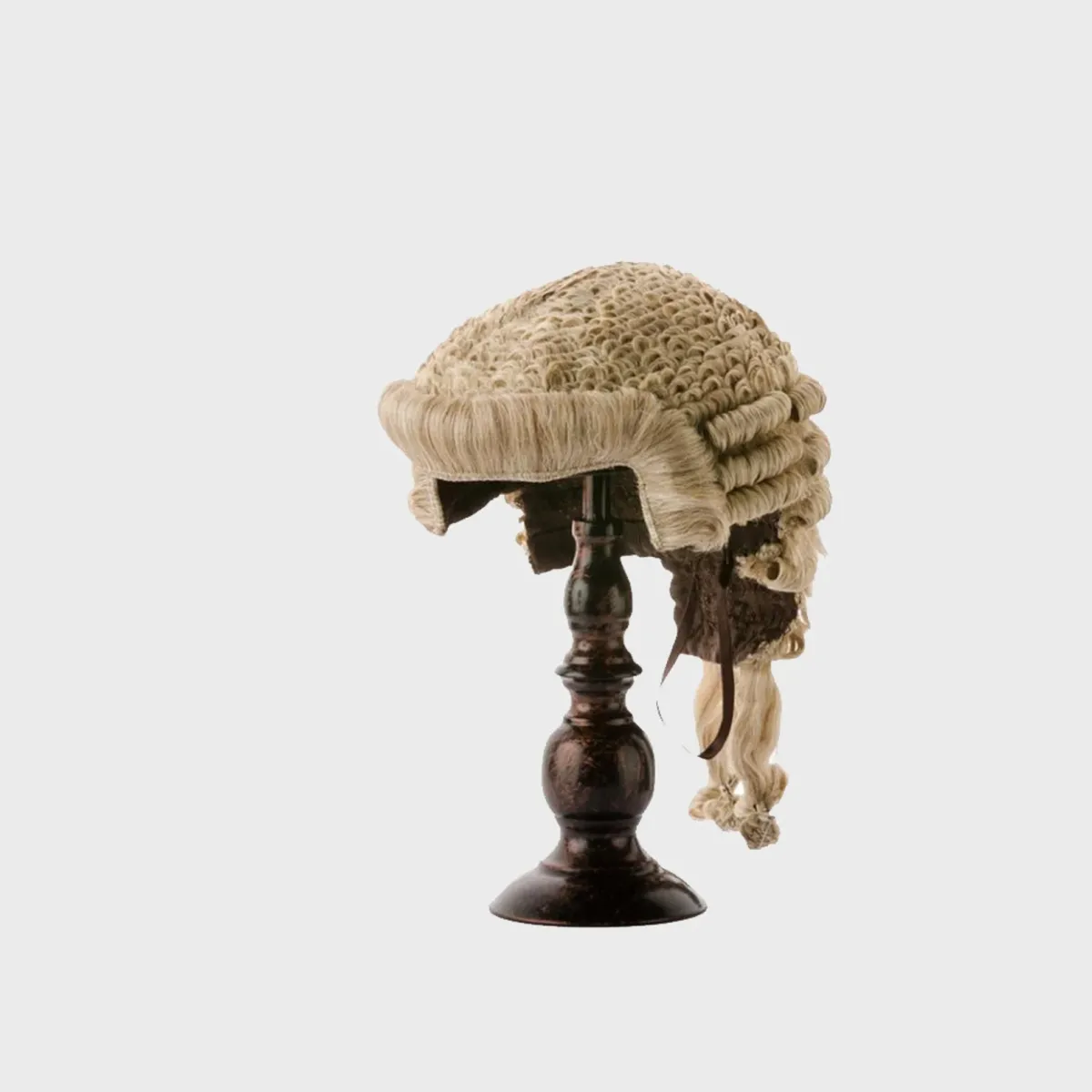Solicitors and Barristers

Law school started last week. I was preparing to start school all of September, including shadowing a barrister to criminal court, which I might write about later. But then I thought I should start with some of the basics for my readers, and answer the question that everyone has been asking me: will I get to wear a wig?
For those in America, where we just have “lawyers” who can do everything, a quick explainer. The jobs in the legal profession in the U.K. are divvied up between barristers and solicitors. The division, when I first arrived here, meant nothing to me. "Barristers have wigs, right?" was about the extent of my understanding. People tried to explain it by comparing it to the NHS – “the solicitor is like your GP, and the barrister is your consultant physician” – which, of course, also meant nothing to me.
Let’s start from first principles. You have likely seen British dramas on, for instance, Masterpiece Theatre on PBS, where the unfortunate apprehended perpetrator asks to have a solicitor present during their interrogations, who tells them to say “no comment” to everything. Solicitors deal with the actual people. They interview clients, gather evidence, put together a brief, draft contracts and paperwork, send angry letters. You get trained typically by going to law school and then taking a big test and getting some work experience. They work in big law firms or in small practices. It’s more recognizable as a “lawyer” to a US audience. If your case gets to the point where you need to go to court, however, your solicitor hires a barrister.
Nothing about barristers is normal.
Barristers participate in the pageantry of court proceedings (aka, the guys with the wigs (yes, the women also wear wigs (the wigs are made of horsehair and cost at least £500))). They had exclusive rights to appear before a judge and argue stuff and have to refer to each other as “my learned friend”. They’re mercenaries, professional advocates, taking cases as they come and arguing their merits before the judge.
Solicitors are employed at regular law firms or in individual practice, but barristers are in “chambers”. Nearly all barristers are self-employed – something like 85% nationwide. As this can be lonely, they form little clubs called chambers. Barristers who work in the same areas of law pool their resources to rent office space and hire staff for chambers. You might think to yourself, wow, sure seems like they have accidentally invented a normal corporation. But no. The barristers are “self-employed tenants” at “chambers” rather than “people" who are "at work” who have “jobs.”
They also have the cab-rank rule, which means as cases come in, whoever is next in line gets the case in the manner of a bunch of taxis waiting for passengers – no preference nor veto power allowed. This whole system creates a lot of very strange dissonances for the American audience. For example: the Crown Prosecution Service, analogous to a District Attorney’s office, assembles evidence from the police et al to charge a crime, but then they have to hire some self-employed dude in a wig to argue the case. The defense solicitor will also have to hire some self employed dude in a wig. Because of the cab-rank rule, barristers switch sides all the time as each case comes in, and often find themselves up against their colleagues from the same chambers. The barristers and judges all know each other and are always gabbing affably before a trial, which I'm sure would be a jarring experience for you as a client just hanging out in the courtroom. You're not paying for antagonism here.
Training for a barrister is differenter and weirder yet. First, you need an additional year of school. (Fine.) Then however you need to join an Inn of Court – the only professional organizations capable of “calling you to the bar”. As there are four of them – Inner Temple, Middle Temple, Lincoln’s Inn and Grey’s Inn – and as they’ve all got a coat of arms and centuries of history, and as there's a dirty rhyme indicating which sort of person gets sorted into which Inn*, it is a ridiculous Hogwarts kinda situation. You go to twelve dinners at your Inn over your year of Bar school, ostensibly to learn from the older and wiser barristers, but also to drink bad port and get some light hazing. Then you have to go get a yearlong “pupillage” apprenticeship somewhere, involving on-the-job training and undoubtedly more hazing. Each year, there are only about 500 spots for pupillage, and about 3,000 applicants. Each chambers only takes on a handful of pupils – sometimes as few as one. Each chambers prepares an insane barrage of interview questions to test your knowledge, but also to see how you respond on your feet. Each chambers designates one of the senior barristers to essentially volunteer their time to teach you how to be a barrister over the term of your pupillage. The way you're paid: "You kill what you eat." i.e., you keep the fees for the cases you do.
The split in the profession emerged because (predictably, like everything here) of class. All the courts were in London, but there are legal problems all around the country, so regional solicitors would hire London barristers, who ran in the same social circles with all the judges and knew which arguments would play. Dealing with clients was seen as “messy” and the barristers were above that, content to leave human dramas to the solicitors. The training for barristers was pretty unaffordable for the average person, and it was expected that men of high station wouldn’t be troubled by such an expense.
But even so, the lines are blurring, probably in response to the international community telling British lawyers to stop being so weird. Solicitors can become “solicitor advocates” and gain rights of audience to appear in every court, and barristers can offer “direct access” and talk to clients directly. Now the profession is more defined by area of practice. Criminal lawyers are in court nearly every day. Commercial lawyers mostly sit behind desks and assemble massive corporate documents. Civil lawyers draft skeleton arguments and show up to tribunal hearings.
Obviously, I’m more interested in the drama route. I’m open to being a solicitor too, but think of the drama!!!
But: wigs are only required in criminal trials. I will probably not be a criminal barrister. But if I am: I will make wearing the wig so handsome that it will be a crime.
Jarred breakfast
Last week we made Eggs in Purgatory, which is where you poach eggs in rich tomato sauce. I started making pasta late one night with whatever I had in the kitchen because I didn’t feel like going to the store, and what I had on hand turned out to be ingredients for a simple tomato sauce. Rachel came home with half a pizza from Theo’s – spicy 'nduja sausage and salami – and I ate that and was no longer hungry, but still finished the sauce and jarred it up for later. And then in the morning I poured the homemade sauce from the jar into the pan, cracked some eggs in, and fancy breakfast was ready in about 15 minutes. I cannot recommend enough making tomato sauce in advance.
There’s not much point giving an actual recipe for tomato sauce – it’s onions, garlic, olive oil, and a can of tomatoes, simmered until tasty – but there are a few tricks I’ve picked up. Chief among them: use parsely stems to flavor the oil before adding anything else, and then take them out after they wilt. It makes the sauce taste slightly brighter and zingier than just adding in dried herbs or fresh basil later on. Next: saute the tomato paste to deepen the flavor. After you’ve softened the garlic and onions, cook the tomato paste in oil until it loses its bright-red color and browns to a brick-ish hue. Last trick: when the oil separates, the sauce is done. It’s a sign that the wet ingredients have cooked through. Chefs across south asia use that as a measure for when their curries are done, too. I have not included a recipe, but I have included a photo.

*I'm sure you can look it up.
